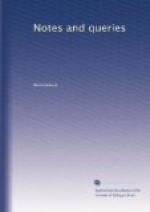The woodward, who carried a bill for such purposes, would also carry a bag, or poke, and might therefore be very appropriately called a poker.
It will be seen in Halliwell’s Dictionary, verb. “Bag” and “Bagging,” and in the Hereford Glossary (London, 1839), verb. “Bag,” that bagging is sometimes used to signify cutting; and, more particularly, cutting for burning.
I mention this, because it may be thought pertinent {205} to the present inquiry; but as this use of the word has been plausibly supposed to be derived from the Welsh Bach, a hook, it seems to have nothing to do with a poke.
E. Smirke.
Querela Cantabrigiensis (Vol. ii., p. 168.).—J.M.B. inquires whether anything is known of the authorship of the Querela Cantabrigiensis? The tract in question appears to have been “written by Bruno Ryves,” the author of Mercurius Rusticus, and some few other treatises, in connexion with which it is commonly bound. Ryves is described by Watt as “a loyal divine,” who was “born in Dorsetshire,” and “died 1677.” His Querela was first printed at Oxford in 1646. There was a second edition in 1647.
In case J.M.B. do not himself intend to send out a new edition of this tract, it is to be hoped that his Query may induce some one else to do so. Indeed, a reprint of several similar pamphlets and short treatises, belonging to the same period, might be brought out with great advantage at this crisis. The series might begin with
“The Answere of the
Vice-Chancellour, the Doctors, both the
Proctors, and other the Heads
of Houses in the Universitie of
Oxford:
“(Agreeable, undoubtedly,
to the joint and uniforme opinion of
all the Deanes and Chapters,
and all other the learned and
obedient Cleargy in the Church
of England:)
“To the humble Petition of the Ministers of the Church of England, desiring Reformation of certaine ceremonies and abuses of the Church. At Oxford: Printed by Joseph Barnes, and are to be sold in Paule’s Church Yard, at the sign of the Crowne, by Simon Waterson, 1603.”
J. Sansom.
“One Bell” (Vol ii., p. 166.)—In the sixth edition of the Book of the Church (I believe references are also given in all editions since the first), Southey gives us his authority for this, “Strype’s Cranmer, p. 266. (edition of 1694.)” The passage occurs in book ii. chap. 26.: “The Duke of Somerset’s death.” I quote it from the reprint by the Ecclesiastical History Society (vol. ii. p. 345.):
“He (Somerset) is generally charged for the great spoil of churches and chapels; defacing ancient tombs and monuments, and pulling down the bells in parish churches, and ordering only one bell in a steeple, as sufficient to call the people together, which set the commonalty almost into a rebellion.”
R.B.




